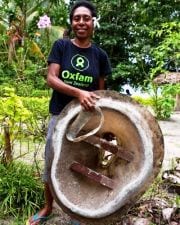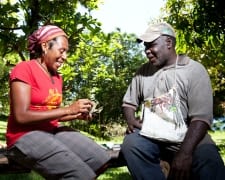We’d like you to meet one woman making a huge difference to the lives of other women – our water engineer in Papua New Guinea and Bougainville, Pauline Komolong.
We’d like you to meet one woman making a huge difference to the lives of other women – our water engineer in Papua New Guinea and Bougainville, Pauline Komolong.
 |
| Pauline holds a typical toilet mould used by Oxfam in PNG and Bougainville. |
Can you tell us a little bit about your work with Oxfam in Papua New Guinea and Bougainville?
I’m a water engineer working on Oxfam’s Water, Sanitation and Hygiene Education (WASH) programme . We started the WASH work in the Highlands of Papua New Guinea in 2005 as part of the peacebuilding programme in Goroka. From our learning and experience over the years, we’ve now established a WASH programme in the semi-autonomous region of Bougainville.
We are currently working in 15 communities in Central Bougainville and two areas in Tinputz, which is in North Bougainville. We’re also assisting the families from the Carteret Islands that have left their homes and resettled in Tinputz. Worsening king tides and salt water pollution of their fresh water and food crops are making their homeland uninhabitable. So we’re providing rainwater tanks and building proper toilets for the families at their new homes in Tinputz.
Can you tell us about your background? What did you study?
I graduated with a degree in civil engineering. When I first graduated, I was working on roads and bridges, but it was so boring just sitting in the office doing design and then other people doing the construction. You don’t really get a feel for what you can actually do. So I wanted to try something different. Shortly after graduating I got interested in doing development work, particularly water and sanitation.
When do you start working as a water engineer?
My first job was doing feasibilities studies on rural water supply but there was no funding for implementation. It was very frustrating to design a water system for a community and see the difference that could be made, but there was no funding to build it.
So then in 2005 I joined Oxfam to work on the water and sanitation programme in the Highlands. I’ve been with Oxfam ever since, designing and implementing gravity-fed rainwater catchment systems and building proper toilets that families are comfortable using out in rural settings of PNG.
What was it about water and sanitation work that first interested you?
 |
| Pauline recieves the community contribution in Kovanis village, Tinputz, Bougainville. Communities contribute 10% towards the cost of the WASH programme to ensure they take long-term ownership of the project. |
Here in PNG, 75% of people live in rural areas and have no access to basic services like water and sanitation. And we’re talking about a population of 6.5 million people. I was one of the lucky 25%.
I grew up in Port Moresby, which is the capital of PNG, and I grew up with a shower and a toilet indoors. But the majority of people still walk for hours every day to fetch water. And they don’t have proper toilets. Many think it’s normal to have diarrhoea.
When I started doing this work with rural communities in the Highlands, I saw that the younger girls would have to go out every day and fetch water and bring it back so that their mothers could start cooking. After that, the girls can then get ready for school classes.
To me it was so different – how difficult it was, especially for the women and children fetching water. I couldn’t bear the thought of having to do that myself – walking for hours carrying a bucket of water just to come back and wash.
What keeps you motivated in your work?
When you first design a gravity-fed system and you turn on the first tap, you see women crying, like tears of joy. Now they don’t have to carry buckets of water for hours and hours each day.
For me it feels like real satisfaction when people appreciate what you’re doing and it actually changes lives and improves the health of the kids. When you start implementing these projects and you’re going back to check on villages, you see that the kids are looking clean and healthy. It makes a lot of difference just to see this and know we’re providing an essential part of something they need to sustain their lives.
I also want to say that without the support of the New Zealand public for Oxfam we wouldn’t be reaching out to those people in rural areas, providing clean water and good sanitation. So I’d like to say thank you from all of us in PNG and Bougainville.
- Read more on Oxfam’s work providing safe water in Bougainville
- Read more on our work towards gender equality
Water for survival: Bougainville
Watch the video to see how Oxfam is helping bring sanitation, water and hygiene to Papau New Guinea.



